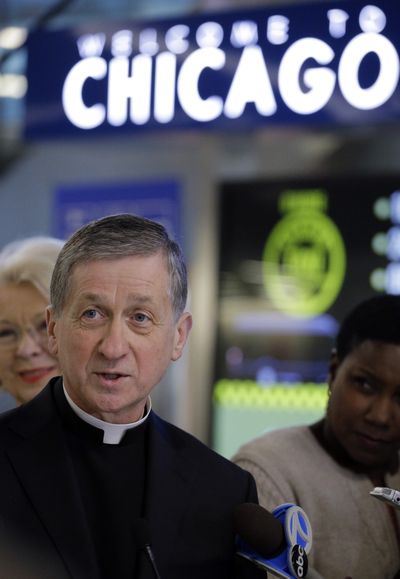Catholic church’s lawsuit against Paine Hamblen can go to trial

A federal judge gave the go-ahead Wednesday for the Catholic Diocese of Spokane to take its legal malpractice claim to trial against the law firm that handled its 2007 bankruptcy.
The ruling opens the door for former Spokane Bishop and now Archbishop of Chicago Blase Cupich to return in February, when he’ll testify about his choice to pursue $3.6 million in legal fees from Paine Hamblen.
“I have every reasonable expectation that he will testify in February,” said Robert Gould, who is representing the diocese in the bankruptcy proceedings.
Cupich accuses Paine Hamblen lawyers of underestimating how many more victims would continue to come forward with sex abuse claims after the bankruptcy was first resolved.
A $1 million fund to pay these people filing “future claims” was set aside based on Paine Hamblen’s estimates of how much it would cost the diocese to settle the claims. But more victims came forward and the fund quickly was depleted, raising the specter of foreclosures on some Catholic parishes that had been put up as collateral.
Cupich orchestrated a complex mediated settlement with the people filing future claims along with Catholic institutions including the Morning Star Boys’ Ranch, which had been the subject of similar claims of sex abuse by Catholic clergy and employees.
In documents submitted to the court, Cupich said that during the mediation process he began to believe Paine Hamblen bungled the bankruptcy. Paine Hamblen has countered the malpractice claims by pointing to the current vitality of the Catholic Church following the $48 million bankruptcy and arguing the diocese purposefully delayed filing its suit against the law firm until after an unfavorable judge retired.
“You can end this now, and you should end this now,” said Paine Hamblen’s attorney, Ralph Cromwell, to U.S. Chief Bankruptcy Judge for Eastern Washington Frederick Corbit.
But Corbit said it would be unfair to dismiss the malpractice lawsuit without allowing all actors to testify in open court.
“There has been a lot of time, money and anger involved in this case,” Corbit said, adding that he was ruling as he did “to make sure that I get it right.”
Corbit’s decision is a procedural one that essentially delays a decision on whether and how much Paine Hamblen would have to repay the diocese, if it is found to have acted inappropriately. The diocese has accused Paine Hamblen of failing to reveal to a judge during the bankruptcy proceedings that it also was representing the then-Bishop William Skylstad on another matter involving the abuse of a child at one of the diocese’s parishes in the 1970s. The law firm contends it was acting not as Skylstad’s personal counsel in that case but in his position as bishop of the church, which wouldn’t have required disclosure in the bankruptcy court.
Corbit will have to sort out the testimony of Cupich and likely his vicar general, Steven Dublinski, at trial. Dublinski said earlier this year that he was informed the malpractice lawsuit, which he believed to contain lies, was filed in order to “sling mud” at the firm and have its insurance coverage kick in, providing a bigger payout for the church. Cupich denied those claims in a declaration filed with the court earlier this month, saying the intention of the lawsuit was to show the church was serious in recouping some of the money it had paid the firm.
Cromwell, Paine Hamblen’s attorney, also said the request was being made too late. The church already has paid Paine Hamblen $3.6 million for legal services, and that money is gone, he said.